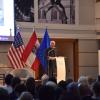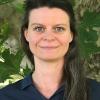
A poem on the Horizon Europe Urban ReLeaf project will be performed at COP28’s United Nations Framework Convention on Climate Change (UNFCCC) Resilience Frontiers Pavilion. Liv Torc of Hot Poets International will take participants on an evocative journey through the project’s six European pilot cities, illustrating the project’s aim of creating just and green urban transitions.
In the hustle and bustle of modern city living, a pioneering initiative is quietly reshaping the concrete landscapes we call home. Urban ReLeaf is on a mission to promote collaboration between local communities and public authorities to revitalize urban areas across Europe, creating greener, healthier, and more just sustainable cities for future generations. Its six pilot cities include Athens, Cascais, Dundee, Mannheim, Riga, and Utrecht.
"Urban ReLeaf is at the forefront of transforming urban environments. Through our innovative approach to urban greening, we are enhancing livable cities, including for the most vulnerable, combatting climate change, and creating sustainable urban ecosystems," notes Inian Moorthy, a researcher in the Novel Data Ecosystems for Sustainability Research Group of the IIASA Advancing Systems Analysis Program and one of the project coordinators.
"At the heart of Urban ReLeaf is our commitment to a data-driven approach. By leveraging wearable devices and sensing technologies, we are able to address gaps, contribute to authoritative datasets, and make informed decisions that drive effective urban greening strategies and policies," adds Gerid Hager, another project coordinator associated with the same program at IIASA.
The collaboration between Urban ReLeaf and the UK-based organization Hot Poets International harnesses the potential of poetry to powerfully communicate climate change science to the public. The poem will be performed live and screened as a video at COP28’s Resilience Pathway 3 – “Providing the world access to Big Data and Information”. It illustrates the pivotal role of citizen science in reshaping the future of cities and the transformative potential of technology in fostering planetary sustainability.
“Powerful narratives can spark conversation and lead to change. This collaboration brings to life the stories of six transformative cites working together to foster resilience for future generations,” Moorthy concludes.
Click on the link below to watch the video.
Further information:
https://urbanreleaf.eu/
News

26 July 2024
Navigating new horizons to protect human and planetary health

14 June 2024
IIASA Leadership visits Washington DC

05 June 2024

